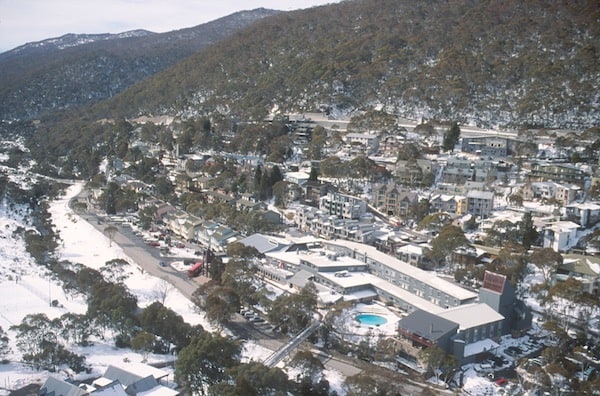My Precious – Frank Sartor’s New National Parks Legislation

Thredbo Alpine Village – Snow resort village development could expand exponentially. Image: Thredbo
Aaron Cook
After losing out on the job of NSW premier to a girl, Frank Sartor was quietly shuffled off into the post of environment minister. Now, like Sauron from Lord of the Rings, he has re-emerged with one bill to rule them all… National Parks, that is.
Conservation groups are warning that new legislation passed by the NSW State Government could radically alter the face of Kosciuszko National Park and strip the Land and Environment Court of its powers to prohibit unsuitable developments in the area.
The bill, passed through parliament on 11 June, outlines changes to the National Parks and Wildlife Act that would drastically alter the permitted uses for national parks in NSW by adding ‘sustainable tourism’ to the list of approved activities.
“The handbrake that has kept national parks free from development has been removed,” said Haydn Washington, Acting Chief Executive Officer of the Nature Conservation Council of NSW.
Belinda Fairbrother, Campaign Coordinator of The Wilderness Society said Frank Sartor pushed through the legislation less than a week after it was introduced in order to stifle debate and limit changes. “There was literally no time for proper consultation and to resolve the complex legal issues,” she said.
Monorail, monorail, monorail…
Several weeks ago The Colong Foundation for the Wilderness received independent legal advice from Senior Counsel Tim Robertson on an earlier draft of the bill which suggested that under the umbrella of sustainable tourism virtually any development could be approved.
“It extends well beyond accommodation for tourists and visitors,” wrote Robertson. “It includes supermarkets … fast food outlets such as McDonalds and Kentucky Fried Chicken, reception lounges for weddings and other celebrations.
“Indeed, there is very little that is done at Darling Harbour and Disneyland that will not be able to be done in a national park.”
Independent Sydney MP Clover Moore, who is also the Lord Mayor of Sydney, opposed the bill’s passage through parliament. “Despite what the Government says about its intentions, the legislation must be tight so that future governments cannot use it to permit resorts, shopping centres and fast food outlets in our national parks,” she said. “I am not confident that this legislation does so and I cannot support it.”
You’ve got to have a plan
Until now the allowed uses for national parks have been tightly defined, so that their management plans had to be consistent with the concept of a ‘public park’.
In turn, if the environment minister approved any development that wasn’t consistent with the management plan of the park, then the Land and Environment Court could overturn the decision.
But under the legislation any activity that qualifies as “sustainable visitor and tourist use and enjoyment” could be included in a park’s management plan. Furthermore, in a case of “the fox minding the chickens”, the environment minister’s department controls the management plans.
Decisions by the minister would become final as long as they complied with the management plan of the park, and the Land and Environment Court would effectively be stripped of most of its powers to protect our national parks from dodgy decisions.
Significance for Kosciuszko still unclear
It’s unclear what the changes will mean for Kosciuszko National Park. The current management plan for the park limits the amount of accommodation within ski resort areas to 10,000 beds and states that no new huts will be built in the rest of the park for public use. A spokesperson for Perisher Blue said they understood the legislation would have no effect on ski resorts.
Bruce Easton, director of Wilderness Sports in Jindabyne said the legislation would allow commercial operators to run sustainable and minimum impact tours into wilderness areas of the park as they did 30 years ago.
“Back then we always ran small group tours with an educational and interpretive slant as to the virtues of the Park and how to use it in a sustainable way,” he said.
“As a small business that understands the environment, history and heritage, because this is our backyard, we would want to preserve this into the future.”
The present laws prevent commercial operators from running tours in wilderness areas, however they do permit educational school groups, that are generally large, to enter under consent arrangements. Easton said the people that guide these groups often lack the knowledge and experience that local tour operators could provide.
Against the will of the people
But while commercial operators around Kosciuszko do not appear too concerned by the changes, Frank Sartor, the current environment minister, has a track record of approving development in the face of public protest.
In his previous position as planning minister, he made frequent use of a similar piece of legislation called Part 3A of the environmental planning and assessment act. Sartor approved the Anvil Hill Coal Mine and the desalination plant at Kurnell. He also approved the Catherine Hill Bay housing development against the wishes of the local council.
In all of these cases local residents were prohibited from arguing the merits of these developments in court. Under this new draft legislation for national parks, the same deal would apply to any developments Sartor or his successors decide to approve in Kosciuszko National Park. It seems that all they would have to do is change the management plan of the park to permit whatever development they want to carry out.
Perisher forecasts,
snow reports and
live snow cams.
Thredbo forecasts,
snow reports and
live snow cams.




